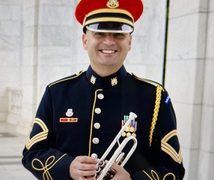Famed teacher and trumpet pedagogue Barbara Butler has a saying: “The four things needed to make it are talent, work ethic, intelligence of work, and perseverance, with the greatest of these being perseverance.” And given her track record of placing students in some of the biggest jobs our industry has to offer, not to mention being one of the most prolific trumpet teachers in history, I’m inclined to believe her.
I’ve never been the most talented person in the room. In most cases, I’ve been far from the talent I’ve seen displayed by colleagues and peers throughout the years. It took a long time to learn how to work intelligently and figure out how to focus my efforts effectively. Many sleepless nights in the practice rooms of as an undergraduate are a testament to years of unintelligent and, honestly, aimless practice. What I did have was work ethic and perseverance. I had a good idea of what I wanted starting in high school and was filled with motivation, but it took many years to figure out how to get there.
Relative to my peers, I’ve often fallen behind the milestones of a “typical” professional musician. I started working with my first private teacher late in high school. I didn’t get accepted into an undergraduate program right out of high school and took a year longer to finish that program than I should have. I wasn’t a good enough trumpet player to get into the level of graduate school I felt I needed to be in, so it took two more years of study and practice, all while working part time jobs, until I was competitive for a conservatory program. And then upon arriving at the New England Conservatory I gained my first true understanding of how much ground I had to make up. By getting into NEC, I had achieved something I wasn’t sure was possible for myself, but I was unprepared for how much farther along my younger peers would be. And then, upon completing my Masters, it took me another year to win my first audition. At every stage of my journey, I’ve started from behind, and it was necessary to dig in and work harder than those around me.
So how did I get from a small Iowa farm to winning a position in The United States Army Band “Pershing’s Own?” The perseverance and work ethic pieces of the puzzle have been well established, but the real catalyst was discovering how to approach my development in an intentional and intelligent way. That, and having a bit of luck.
My junior year as an undergraduate, I was floundering and stuck. I knew what I wanted but had no idea how to get there. As chance would have it, my teacher brought in guest artist Anthony Prisk. At the time he was the 2nd trumpet of the Houston Symphony, but he currently is the 2nd trumpet of the Philadelphia Orchestra. I had the good fortune of getting two lessons with him, and those lessons changed the direction of my life. It became clear that I needed exposure to a completely different way to approach the instrument. At his suggestion I attended the annual International Trumpet Guild conference later that year. As luck would have it, the conference was held in Minneapolis, MN, that year, only four hours from where I was attending school and a city where I had family living. A perfect situation for a poor undergraduate student.
Attending that conference was incredible. I heard people doing things on the instrument that I didn’t know were possible. I attended clinics and masterclasses that presented ideas I’d never considered. Far and away the most important part of the conference was attending a masterclass by Minnesota Orchestra 2nd trumpeter Robert Dorer. He had a way of making the trumpet sound effortless, and his teaching and gentle demeanor made the instrument feel approachable. After his class I spoke to him and essentially begged for a lesson, to which he graciously agreed. For the next three years, twice a month I drove the four plus hours to Minneapolis to study with him. It was challenging, but without those years with him I would not have a career. He taught me how to think about problems and how to find solutions. Since then, there have been many other teachers and influences that I’ve sought out and played for, all chosen for deliberate and specific reasons.
I’m still learning and seeking out old and new influences to continue to improve. New ideas and methods to try, players to be inspired by, and approaches to experiment with. In short, to continue to be curious, and to strive to be more intelligent with my approach. So again, as Barbara Butler says, “talent, work ethic, intelligence of work, and perseverance” are the requirements to make it. I believe anyone with a modicum of talent, but especially the last three requirements, can be successful in music, and basically anything else they strive to achieve. That’s certainly been the case for me.
USArmyBand.com





























